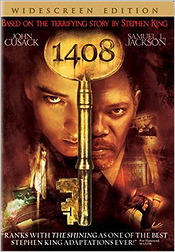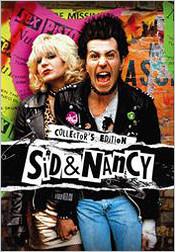 |
Site created 12/15/97.

page added: 10/16/07
The Spin Sheet
DVD reviews by Peter Schorn of The Digital Bits
| Ironically,
he's never seen a ghost nor observed any real signs of paranormal
activity despite toting spectre-detecting gear. He also carries some
issues involving his father - whom he wrote about in an early novel
- and his child, whom we can immediately sense is deceased through
the constant oblique references to past personal tragedy. (It's
front and center in the trailer, too.) While sifting through the mail full of brochures from hopeful haunted hotels seeking his recognition, he comes across a postcard for the Dolphin Hotel in New York City with a single line of warning: "Don't stay in room 1408." Sensing a come-on, he looks into the hotel's background and discovers that dozens of suspicious deaths are connected to the hostile hostel. Hooked, he tries to book the room, only to be told that it is unavailable. Using some legal saber-rattling from his publisher about the civil rights ramifications of denying lodging, he finally makes a reservation and heads to the Big Apple to see what the 411 is in the 212. Upon his arrival, he is met by the hotel's manager, Gerald Olin (Samuel L. Jackson), who implores him to reconsider for a total of 56 people have met their ends in 1408 and that no one has been able to stay longer than an hour. Figuring this is all part of the sideshow hype, Enslin still insists on staying in the room and Olin reluctantly accedes. Naturally, the room which starts off appearing quite banal gradually grows more and more malevolent and great chaos ensues. After a leisurely beginning, 1408 does an effective job at cranking up the tension as weird things occur. Since it's basically a one-man show, Cusack is charged with showing how the skeptical Enslin starts off thinking he's being pranked only to realize that perhaps Olin was right and that 1408 is "an evil f*cking room" and he's quite good in his performance. (Jackson is good, too, though he has little to do but be charmingly menacing for a couple of scenes.) Unfortunately, as events escalate 1408 starts to become jumbled and incoherent. Is he being visited by his personal demons or are there really ghosts leaping out the windows? Is the room a slice of Hell for all who stay or just Enslin? It's never really clear and the double-twisty last act that doesn't stick the pike landing only dissipates the well-earned chills earlier. It doesn't help that the film doesn't even follow its own rules; we're told that a standard issue magnetic card lock isn't on the door because electronics don't agree with the space, but everything in the room from the television to Enslin's laptop works fine. Granted, a clock radio that plays nothing but The Carpenters is pretty hellish and the TV switches from providing SpectraVision to SpectreVision, but is this a sign of pure evil or that perhaps booking lodging online isn't the smartest way to travel? Considering how the horror genre has been taken over my sadistic "torture horror" flicks and copious amounts of gore, it's almost quaint how 1408 tries to deliver the tense chills of a suspenseful yarn, but good intensions don't inherently result in good movies. By the time the final shoe drops, it's not very satisfying because we're not sure what the heck was happening in that room and the attempt to tack on a Theramin-worthy ending seems forced. The 2.35:1 anamorphic transfer is a nice presentation with good detail and color and a minimum of artifacts or noise. The use of golden tones in some scenes and desaturated greenish-grays in others are well rendered. On the audio front, the subtle details of the audio mix are clearly reproduced with nice attention to the surround channels. In one scene where Enslin is struck deaf, the use of an ultra-low frequency tone along with near-dog whistle high frequency ringing is neat. While the frequency extremes are well done, some of Cusack's muttered lines of dialog were a little hard to pick out. Supplemental materials are in short supply on the single-disc edition (note that a 2-disc collector's edition is also available), starting with a pair of alternate endings (5:25 and 5:10 respectively) whose running times are padded out by the inclusion of a hefty chunk of lead-in material. That they had at least three choices of endings reveals the haphazard throw-a-dart-pick-an-ending storytelling at play here; based on what came before, any result could've been acceptable. Of the three endings (including the original), I preferred the second alternate the most because it was the most ambiguous and unsatisfactory. Rounding out the extras are a pair of webisodes - John Cusack on 1408 (2:31) and Inside Room 1408 (2:08) - which are just straight promotional pieces meant to entice viewers the theaters and, naturally, are light on revelations, though the latter actually shows a glimpse of how some of the physical effects were done. While not the best or scariest film made from a Stephen King story, 1408 is an adequate rental prospect for like most hotel rooms, while it may be worth visiting, you wouldn't want to live their permanently. |
| Coming
off his 1984 gutter punk indie hit, Repo
Man, writer-director Alex Cox was primed to tackle the
still-fresh legend of the Sex Pistols, but as he researched the
band's story, he was drawn to the tragic junkie couple and Sid
& Nancy was the result. Bolstered by career-peaking performances by Gary Oldman and Chloe Webb, it contains some indelible imagery such as the shot of them kissing in the alley while garbage rains down around them and the recreation of the "My Way" video shoot. But while Sid & Nancy has been regarded as a punk Romeo and Juliet tale, viewing it now for the first time in two decades, it's remarkable how thin and repetitive it is. There's not much of a story to tell other than one day Sid met Nancy and after giving her money to buy some drugs, she splits leaving him waiting in the rain. When their paths cross again after she's left behind by rock star Rock Head (Stuart Fox) while scoring him drugs, they reconnect and proceed to shoot copious quantities of smack, puke, fight, scream, nod out, shoot some more, rinse, and repeat for the duration of the movie. The Pistols' diabolical manager - and I mean that as a compliment - Malcolm McLaren (David Hayman) is portrayed as more bemused than concerned by the decline of Sid because he never thought of him as more than a means to an end (i.e. making cash from chaos). The band's kamikaze tour of America is merely an afterthought as well. Revisiting the film so long after I'd seen it during its original theatrical run, it was interesting to note what had been edited out of my memory of the film. I'd always thought the "My Way" scene, in which Sid ends up pulling a gun and shooting the audience in Peckinpah-esque fashion was the end of the movie, but it actual occurs at the midpoint. That leaves another hour to fill with more drug-taking and histrionics. Cox portrays Nancy's death as a drug-fueled accident, but since this pair was pretty much dead when they started riding the horse together (so to speak) it is more a fait accompli. Unlike some films which have been accused of glamorizing drug use - tarting it up as "heroin chic" - there is nothing charming about the way Cox portrays the method by which these lost souls throw their lives away. While Oldman and Webb are unflinchingly unsympathetic and realistic at the core of the film, the surrounding characters are almost cartoonish in their performances. (Deliberately at Cox's insistence according to the extras.) It's also amusing to spot Xander Berkley (24's George Mason) as their dealer and a chubby Courtney Love as a friend. (I'll leave all the wisecracks about Courtney's own Nancy-ness and how the film's working title - Love Kills - may apply to her relationship to Kurt Cobain to more catty folks.) The 1.85:1 anamorphic transfer starts off looking a tad dingy and murky, but it improves in brighter scenes. The color palate is generally subdued in keeping with the grimy settings, but rendered properly. Some moderate grain is evident, but the print is clean and free of excessive damage. Distant details and shadow areas could've been better defined and black levels could've been stronger, but don't detract too much from the presentation. On the audio front, the new 5.1 Surround (in name only) mix is a mixed bag with musical scenes being louder than the dialog-driven ones, which sometimes results in some crucial details, like Nancy asking Sid to kill her early on, to be lost. There is also a tinny thinness to much of the dialog. Unlike the now out-of-print Criterion edition (reviewed here) which came with commentaries and a slew of fascinating-looking historical extras, this new Collector's Edition (for now only available as a Best Buy retail exclusive) only has a pair of featurettes - For the Love of Punk (15:40) and Junk Love (15:25) - which are built from interviews with music and film journalists including MTV's Matt Pinfield and Kurt Loder, Entertainment Weekly's Owen Gleiberman, Rolling Stone's Joe Levy as well as friends of the couple. They provide some sorely-needed background and context for the film, but are noticeable devoid of any pictures of the actual people, save one photo of each at the very end. It's weird to have photographer Bob Gruen talk about the pictures he took without seeing them and having stills from the film used in their place. I guess there must be some licensing legalisms to blame, but it still kicks the usefulness of the featurettes in the shins. Perhaps the most telling comment comes from the friend who remarks that if it weren't for the circumstances of their notoriety, no one would've made a movie about either of them. Indeed. Fans who appreciate the squalid charms of this film and who are looking to retire their worn-out VHS copies of Sid & Nancy may be satisfied with this slim edition, but for those who are curious about the details behind the story - John Lydon has called the film the "Peter Pan version" and Spungen's mother's book "I Don't Want To Live This Life" paints Nancy as downright insane - will be left wanting. Peter Schorn peterschorn@thedigitalbits.com |
 |
| Site
designed for 1024 x 768 resolution, using 16M colors and .gif 89a
animation. © 1997-2015 The Digital Bits, Inc., All Rights Reserved. billhunt@thedigitalbits.com |


